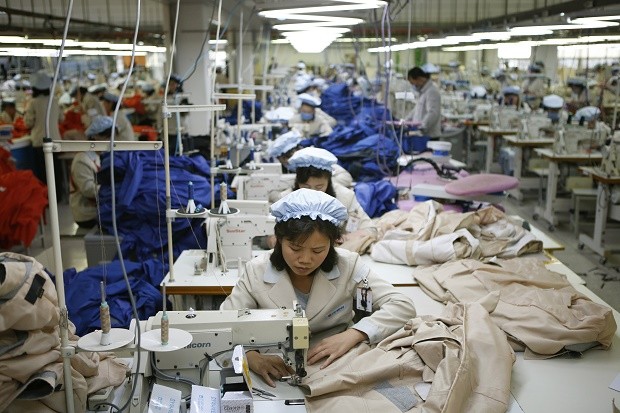South Korean firms begin pull-out from industrial park in North

In this Dec. 19, 2013, file photo, North Korean workers assemble jackets at a factory of a South Korean-owned company at the jointly-run Kaesong Industrial Complex, in Kaesong, North Korea. South Korea says Wednesday, Feb. 10, 2016 it will halt operations at joint industrial park with North Korea in response to the North’s recent rocket launch. AP
SEOUL, South Korea — South Korean companies prepared Thursday to begin pulling out of a jointly-run industrial zone in North Korea after Seoul shut it down to punish Kim Jong-Un’s regime for its recent nuclear test and rocket launch.
Wednesday’s announcement to close the Kaesong complex took many by surprise, given that South Korea had always allowed it to remain open despite serious provocations in the past.
Defending what it called an “unavoidable” decision, the South said North Korea had been using the hundreds of millions of dollars in hard-currency cash that it earned from Kaesong to fund its nuclear weapons and ballistic missile programs.
READ: S. Korea to shut down joint industrial park with N. Korea | North Korea launches space rocket; defies threats
At a time when the international community is struggling to agree on how to punish the North for last month’s nuclear test and Sunday’s long-range rocket launch, “there is a need for Korea… to show leadership,” the government said in a statement.
For the owners of the 124 South Korean companies operating factories in the estate, the move would appear to sound the death knell for what had become an increasingly vulnerable project in recent years, as both sides sought to leverage its symbolic and economic importance.
While discussion of Kaesong has often focused on its financial importance to the cash-strapped North, it has also been a lucrative concern for many of the companies involved.
As well as cheap, Korean-language labour, they received preferential loans and tax breaks from the South Korean government, which also effectively underwrote their investment.
Owners’ outrage
An association representing the owners slammed the shutdown order as “utterly incomprehensible” and complained they hadn’t been given enough advance warning to sort out their affairs.
The border crossing for Kaesong — which lies 10 kilometers (six miles) inside North Korea — has been closed in recent days for the Lunar New Year holiday, and was to open Thursday morning.
With only a skeleton staff overseeing operations there over the holiday period, a large number of South Korean managers were expected to cross in to Kaesong to start organizing the pullout.
Seoul has called on Pyongyang to ensure the “safe return of our citizens” amid concerns that the North Korean authorities might refuse to let everyone leave.
In September 2014, Pyongyang had drafted a new operational regulation — rejected by Seoul — that would have allowed the North to detain South Korean businessmen in Kaesong in the event of an unresolved business dispute.
There has so far been no official reaction from Pyongyang to the shutdown.
Born out of the “sunshine” reconciliation policy initiated in the late 1990s by then-South Korean president Kim Dae-Jung, Kaesong opened in 2004 and proved remarkably resilient, riding out repeated crises that ended every other facet of inter-Korean cooperation.
Even in 2010, when the South accused the North of sinking one of its warships and imposed punitive sanctions, the Kaesong factories, which produce labor-intensive goods such as clothing and kitchenware, remained open.
The only exception was in 2013 during a period of heightened cross-border tensions when Pyongyang effectively shut down the zone for five months by withdrawing its 53,000 workers.
RELATED
Key developments following North Korea’s rocket launch
North Korean satellite ‘tumbling in orbit’–U.S. reports














